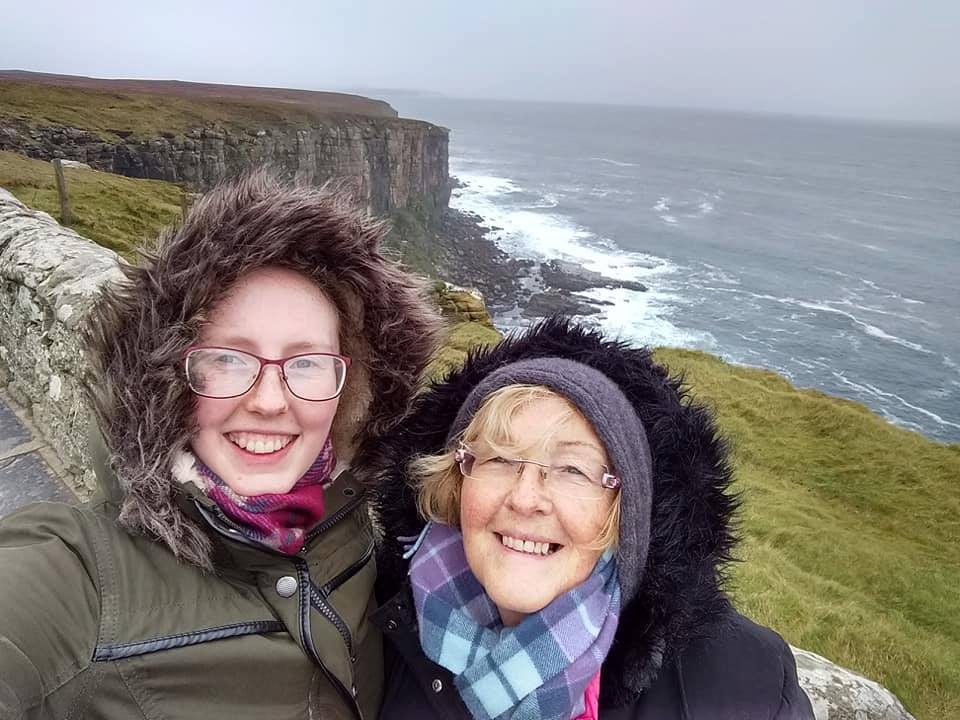Each year, our campers look forward to finding out more about the awesome staff they’ll get to meet over the summer. We now have a full staff of counselors on board and we’re excited to introduce you to our first girls’ counselor: Beth Revuelta! This outgoing, red-haired Scotswoman is excited to share her experiences, enthusiasm and Scottish accent with our campers. Not only is she adventurous, fun-loving and a ceilidh dancer (Scottish dancing), she’s also dyslexic! We know that our campers will be in good hands with Beth, but they’ll also be inspired by her! Beth tells us a little about herself below. Please join us in welcoming Beth to the Camp Spring Creek family!
Beth and her mum, braving the elements!
What made you interested in working at Camp Spring Creek?
Dyslexia is a big part of my identity and has had a huge role in shaping who I am as a person! Working at this camp is the step in the right direction for me. I’m interested in working in this area in the future because I feel dyslexic people have a lot of hidden potential! If we support dyslexic people in discovering and mobilizing all these hidden strengths the world could be a very different place!
Have you worked at a camp or with kids before?
Scotland doesn’t have the same summer camp culture as North America–probably because it’s too cold! So I have never worked at camp before but have plenty experience with children! I am a Girl Guide (Scout) leader, I used to be a volunteer leader at a deaf youth club and a disabled children’s play program. I am a Saltire Awards Ambassador, helping young people getting into volunteering and I was a part of the team rolling out our Toddler Festival at my work.
What were you like as a child? Did you attend camp yourself?
I did go to some international jamborees with my Girl Guides, one in the Queen’s garden at Windsor Palace-some of the best holidays of my life!
I was energetic, out-going, and unique or “ploughed my own furrow” as my mum likes to say! I loved making friends and drama/acting (which turned out very important for my future!). I was a late bloomer, the difficulties with my dyslexia were very prominent–I couldn’t read the time till I was 14 and didn’t learn to spell my full name till last year! (Beth Siobhan Revuelta!) But I’ve came into my own in high school and adulthood!
What do you do during the school year?
I work at a tourist attraction in Edinburgh called Camera Obscura and World of illusions. It’s a museum of optical illusions. I like to watch people get lost in the mirror maze and zap each other with the plasma balls! The top of the building is a ginormous Victorian Periscope Camera Obscura that is 165 years old. I show people how this works and give them a tour of Edinburgh using it.
What passion of yours are you excited to share with campers?
I really love acting, improvisation and theater, so hopefully I can play some imrpov games and get some acting workshops going!
What’s your favourite group game/activity/sport?
I love ceilidh dancing! It’s a traditional type of Scottish dancing that is usually danced in pairs or groups. It has lots of spinning and fast music!
What do you like to do during your free time?
I am in a gospel choir. I love going to the theater and acting, often in the Edinburgh Fringe Festival! I enjoy practicing my British Sign Language skills with my deaf friends and doing yoga (mainly for good mental health!).
What advice can you give to campers about being away from home/being successful at camp?
It’s alright to be scared, upset, or worried about being away! All of us feel that, including us adults. Please come chat with us. We’re here to listen not judge!
I usually try to focus on the people and environment directly around me and throwing myself into the activities or helping others. That way, my worries will slowly go away.
What do you hope to get out of your summer at camp?
I hope to pass on some things I have learned being a dyslexic that I wish I had known when I was younger, such as, you are intelligent! I hope to learn a bit more about how to teach dyslexic people and how education and dyslexia interact. I’m excited for doing outside activities and learning some more outdoor skills!



















































